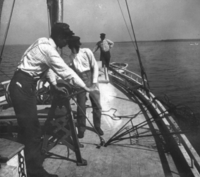Chunata (caste)
The Chunata (Sometimes known as Yonata or sabondra in Haboya) is a Cananganamese maritime community, mainly living along the southwest coast of Nagu. Historically, they were inhabitants of Ciltre within Cananganam. An officially recognized sub-community within Cananganam and Haboya, they have a long history and find mention within numerous ancient Cananganamese literature.
In modern day Cananganam, the Chunata have special privileges with regards to fishing rights in the country, and are the only peoples legally permitted to handle net and trap-based fishing in the country.
Etymology
The name Chunata comes from a word in Classical Cananganamese meaning "One who studies to fish using a net". Similarly, this has been calqued into the Cenja language as sabondra where it has a double meaning for a ship captain, as in Haboya many Sawyans were employed as laborers under the sabondra's expertise and guidance since the 19th century when caste divisions began to blur.
History
The Chunata are believed to originally have been a Sawyan tribe based on cross-genetic and linguistic evidence, but had quickly adopted an Asuranesian language due to extensive trade contact. The first literary mention of them was in 341 BCE, in a dispatch from a Cananganamese noble making mention of the Chunata's maltreatment of crustaceans. Despite this initial dispatch, it seems the cultural differences were swiftly mended and the chunata were welcomed into the Cananganamese empire's caste hierarchy. They stood outside of the typical hierarchy, being above the phujja (serfs) but below the chee (merchants).
In an edict declared on 1081, the Chunata were granted special customs rights to netting, as the practice would sometimes come into contact with crustaceans making the task require special consultation of the experienced fishermen so as not to disrupt their lifestyles. This experience left them in sizable control of Cananganam's fishing industry, and were noted for their extensive knowledge of yearly weather cycles and their impact on fish harvests. This same edict also declared that the Chunata were not permitted to practice scarrification, but rather to practice tattooing instead due to falsification of fishing experience becoming a prolific issue.
The most notable of the chunata families is the Toma and Kakoyi families, who currently hold significant influence on Haboya's political and economic structures.
Occupations
Historically, the chunata had been limited to fish and sail related professions, but with the abolition of the caste system in the 19th century, they have enjoyed exposure to other professions. Today, they are still favored in the fishing and sailing professions as masters of their trade, and their tools are well-sought after by others in the trade among Nagu.
